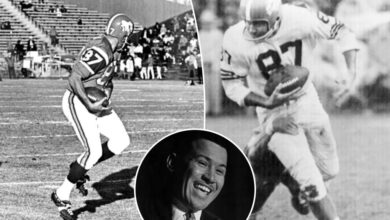Stream It Or Skip It?
In 2023, Shiny Happy People: Duggar Family Secrets was called a “limited” docuseries. But it clearly made a splash, because Shiny Happy People has returned to Prime Video for a three-episode second season, this time taking on a Teenage Holy War. Directed by Cori Shepherd and Nicole Newnham, Shiny Happy People: A Teenage Holy War interviews many former participants as it goes inside Teen Mania, a particularly fervent Christian youth movement founded in the 1990s. These were people who were already evangelicals. True believers. But looking back on their exposure to its hyperized indoctrination of radical Christian faith and unquestioned authority, a lot of them now prefer the term “ex-vangelical.” “We believed we were changing the world,” a Teen Mania alum says. “But then it gets weird.”
Opening Shot: Amy Duggar King, Duggar family cousin and a Shiny Happy People returnee, sits for an interview with husband Dillon King. “This is the response to Season 1 from Jim Bob and Michelle…”
The Gist: It’s not surprising the Duggars don’t like this docuseries. But Duggar King can only roll her eyes as she reads the statement and its wish to discuss serious allegations of patriarchal control and sex abuse “in a private setting.” Shiny Happy People wasn’t staying private with its first season, and it’s not staying private in its second, which uses firsthand accounts and analysis from journalists and authors to explore Teen Mania, a Christian youth group founded by Ron Luce. With his wraparound Oakleys, extra mullet-y mullet, and keyed-up God Is Great proclamations, Luce was the public face for proselytizing about Teen Mania’s charms. A place to be welcomed, to belong, to learn how cool it was to be crazy for Jesus – and in so doing, create a marked rejection of secular culture and all of its sexual and anti-Christian imagery. Rock and rap from major CCM artists like Newsboys and Carman, flashpots and strobe lights, and Luce driving his God-fueled motorcycle right onto the stage. “That was the peak,” Teen Mania alumnus Phil Boltz says of the organization’s Acquire the Fire rallies. “It was very spiritual, and it was also kind of awesome.”
Spiritual, awesome – and all part of a dastardly plot generations in the making? In Teenage Holy War, journalist Jeff Sharlet plots the rise of Ron Luce and Teen Mania on a larger timeline that encompasses efforts by powerful forces on the religious right to fuel a systematic takeover of American culture and political life. Teen Mania was the tinder for church youth groups. Acquire the Fire was the lighter fluid. And the Honor Academy, Sharlet says, “was the finishing school” for an elite cadre of Christian soldiers Teen Mania had minted in its lordly fires.
What’s striking about the former Teen Mania-ers interviewed here is how all-in they once were. Mica Ringo describes Luce’s aura at the time as like a mythic figure. “The idea that this could be bad doesn’t enter your mind.” But even as it preached to a choir it built, participants started to see through the cracks. Was all of the talk about giving themselves to God legit, or were they actually giving themselves to a project made on earth by mortal men with their own agenda? Maybe Teen Mania wasn’t about church or religion at all, Dillon King says. Maybe it was just “man-made-up bull crap.”

What Shows Will It Remind You Of? The first season of Shiny Happy People is well worth a watch. You can’t compare the Teenage Holy War footage from inside Acquire the Fire rallies to the outrageousness of The Righteous Gemstones and tell us Danny McBride isn’t a genius of cultural commentary. And Teenage Holy War with its tales of indoctrination and forced allegiance to authority had us thinking about Teen Torture, Inc., a harrowing three-part exploration of TTI, or the “Troubled Teen Industry.”
Our Take: Proof of the impactfulness of Season 1 of Shiny Happy People arrives a few seconds into Season 2, when Amy Duggar King reads aloud Jim Bob and Michelle Duggar’s desperately dismissive statement. Why is it that these folks, when presented with legitimate questions about their operations, can only lash out at the docuseries and its participants? Doesn’t it seem decidedly un-Christian to reject the series wholesale when so many people, some of them Christians themselves, expressed their validation at what it revealed? One answer to this question is in the editing for Teenage Holy War, which cuts those testimonials of gratitude into supercuts of the dismissals. At every turn, and now across two seasons, Shiny Happy People is never willing to simply accuse, and instead provides space for interviewees to speak directly from experience.
This approach makes the whole thing more powerful, and a lot tougher to take. While the first episode of Teenage Holy War lays the groundwork, later installments will travel further inside what seems to have been layers of indoctrination consciously constructed to obfuscate true aims. “The real outcome?” asks one ex-Teen Mania participant. “They are creating soldiers.” And when you figure in the politics angle, the lawmakers currently traveling in Washington, DC circles Jeff Sharlet calls “political Christian conservatives,” the experiences described in Teenage Holy War can begin to be seen as structural planks in a national building project many of us never asked for. All these Teen Mania kids wanted was to feel a sense of belonging. “A basic human need,” says alumnus and gospel singer Dani Rocca-Herbert. Their wish for faith to be a personal path toward good, corrupted by larger forces with selfish intentions at heart.
Sex and Skin: None. For shame! Inside its flashy stadium productions, Teen Mania was redirecting normal teenage pheromonal heat toward the Big JC. “Get on fire for God!”
Parting Shot: “We were believers, but we knew something was weird.” As Teenage Holy War teases its second episode with scenes from inside Teen Mania’s boot camp-style Honor Academy, many alumni interviewed say their indoctrination was so complete, there was nowhere to turn when things got nuts.
Sleeper Star: As kids, siblings Phil Boltz and Liz Boltz Ranfeld were both majorly into the Teen Mania scene. Interviewed together for Teenage Holy War, they’re a mix of approachable charm and real insight into the program.
Most Pilot-y Line: “This was fascism in front of me on a massive scale,” journalist Jeff Sharlet says in Shiny Happy People: A Teenage Holy War. “Teen Mania was a part of a broad movement, created by big heavy political players, to blow up the order as it is. This is the generation that was raised to seize power.”
Our Call: Stream It. Just as the first season of this docuseries did for its analysis of the Duggar family, Shiny Happy People: A Teenage Holy War brings the receipts for its startling look inside Teen Mania and the systemic indoctrination of evangelical Christian youth.
Johnny Loftus (@johnnyloftus.bsky.social) is a Chicago-based writer. A veteran of the alternative weekly trenches, his work has also appeared in Entertainment Weekly, Pitchfork, The All Music Guide, and The Village Voice.
Credit to Nypost AND Peoples



